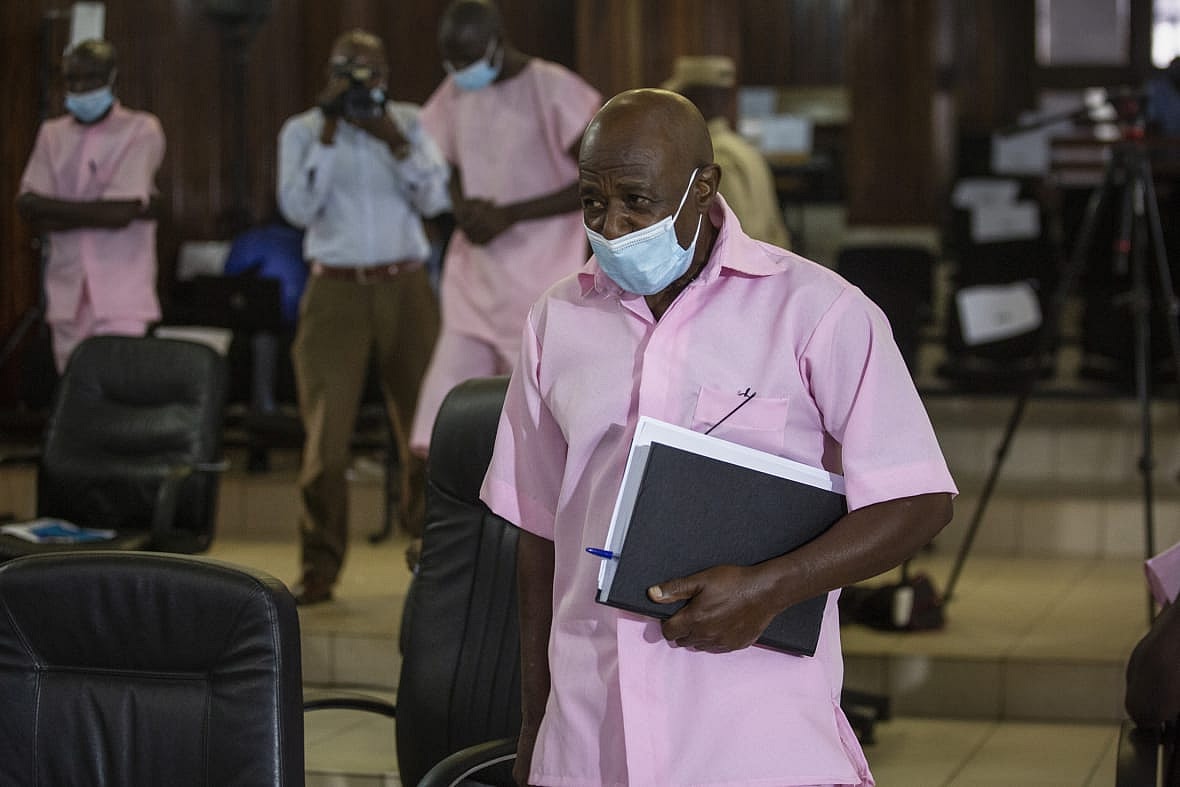Rwanda’s government has commuted the 25-year sentence of Paul Rusesabagina, who inspired the film “Hotel Rwanda” for saving hundreds of countrymen from genocide but was convicted of terrorism offenses years later in a widely criticized trial.
Government spokeswoman Yolande Makolo told The Associated Press on Friday that the presidential order was issued after a request for clemency on behalf of Rusesabagina, a 68-year-old U.S. resident and Belgian citizen. Senior U.S. officials said Rusesabagina arrived late Friday at the home of the Qatari ambassador in the Rwandan capital of Kigali and was expected to leave the country in the coming days.
U.S. President Joe Biden hailed the news, saying, “Paul’s family is eager to welcome him back to the United States, and I share their joy at today’s good news.” He thanked the governments of Rwanda and Qatar, as well as U.S. government officials who worked “to achieve today’s happy outcome.”
Nineteen others also had their sentences commuted. Under Rwandan law, commutation doesn’t “extinguish” the conviction, Makolo added.

“Rwanda notes the constructive role of the U.S. government in creating conditions for dialogue on this issue, as well as the facilitation provided by the state of Qatar,” she said. President Paul Kagame earlier this month said discussions were under way on resolving the issue.
Qatar foreign ministry spokesman Majid Al-Ansari said in a statement that “the procedure for (Rusesabagina’s) transfer to the state of Qatar is under way and he will then head to the United States of America. This issue was discussed during meetings that brought together Qatari and Rwandan officials at the highest levels.”
The senior American officials, who briefed reporters on condition of anonymity under U.S. government ground rules, declined to comment on Rusesabagina’s current health but said they had made medical and psychological care available.
The case had been described by the U.S. and others as unfair. Rusesabagina disappeared in 2020 during a visit to Dubai in the United Arab Emirates and appeared days later in Rwanda in handcuffs. His family alleged he was kidnapped and taken to Rwanda against his will to stand trial.
He was convicted on eight charges including membership in a terrorist group, murder and abduction. But the circumstances surrounding his arrest, his limited access to an independent legal team and his reported worsening health drew international concern.
One senior U.S. official said the White House’s goal was to shift from Washington denouncing the case — and Kigali defending its legal system in response — toward a “constructive sequence to work our way mutually, collectively, out of the predicament we found ourselves in.”
As part of the effort, Biden’s national security adviser, Jake Sullivan, had multiple phone calls with an unnamed close adviser to Kagame, the official said.
Rusesabagina has asserted that his arrest was in response to his criticism of Kagame over alleged human rights abuses. Kagame’s government has repeatedly denied targeting dissenting voices with arrests and extrajudicial killings.
In a signed letter to Kagame dated Oct. 14 and posted on the justice ministry’s website, Rusesabagina wrote that “if I am granted a pardon and released, I understand fully that I will spend the remainder of my days in the United States in quiet reflection. I can assure you through this letter that I hold no personal or political ambitions otherwise. I will leave questions regarding Rwandan politics behind me.”
Rusesabagina was credited with sheltering more than 1,000 ethnic Tutsis at the hotel he managed during Rwanda’s 1994 genocide in which over 800,000 Tutsis and Hutus who tried to protect them were killed. He received the U.S. Presidential Medal of Freedom for his efforts.
He became a public critic of Kagame and left Rwanda in 1996, first living in Belgium and then the U.S.
Human Rights Watch said he had been “forcibly disappeared” and taken to Rwanda. But the court there ruled he wasn’t kidnapped when he was tricked into boarding a chartered flight. Rwanda’s government asserted that Rusesabagina had been going to Burundi to coordinate with armed groups based there and in Congo.
Rusesabagina was accused of supporting the armed wing of his opposition political platform, the Rwandan Movement for Democratic Change. The armed group claimed some responsibility for attacks in 2018 and 2019 in southern Rwanda in which nine Rwandans died.
Rusesabagina testified at trial that he helped to form the armed group to assist refugees but said he never supported violence — and sought to distance himself from its deadly attacks.
Rusesabagina also has said he was gagged and tortured before he was jailed, but Rwandan authorities denied that. His attorney, Felix Rudakemwa, asserted that Rusesabagina’s legal papers were confiscated by prison authorities.
After his sentence, Belgium’s then-foreign minister, Sophie Wilmes, said that “it must be concluded that Mr. Rusesabagina has not been given a fair and equitable trial.”
Last year, U.S. Secretary of State Antony Blinken met with Kagame in Rwanda and discussed the case. “We still have conviction that the trial wasn’t fair,” Blinken told journalists.
“It is a relief to know that Paul is rejoining his family, and the U.S. Government is grateful to the Rwandan Government for making this reunion possible,” Blinken said in a statement Friday, adding: “The United States believes in a Rwanda that is peaceful and prosperous. We reaffirm the principle of seeking political change in Rwanda and globally through peaceful means.”
As the news spread on Friday, Rusesabagina’s family in a statement said that “we are pleased to hear the news about Paul’s release. The family is hopeful to reunite with him soon.”
TheGrio is now on your TV via Apple TV, Amazon Fire, Roku, and Android TV. Also, please download theGrio mobile apps today!

